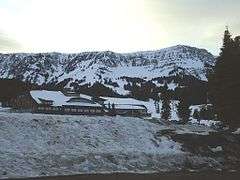Bridger Bowl Ski Area
| Bridger Bowl Ski Area | |
|---|---|
 Base area in March 2005 | |
 Bridger Bowl Ski Area Location in the United States | |
| Location |
Gallatin National Forest Gallatin County, Montana |
| Nearest city | Bozeman |
| Coordinates | 45°49′05″N 110°53′49″W / 45.818°N 110.897°WCoordinates: 45°49′05″N 110°53′49″W / 45.818°N 110.897°W |
| Vertical | 2,600 feet (792 m) |
| Top elevation | 8,700 feet (2,652 m) |
| Base elevation | 6,100 feet (1,859 m) |
| Skiable area | 2,000 acres (8.1 km2) |
| Runs | 71 |
| Longest run | 3 miles (4.8 km) |
| Lift system |
8 chairlifts - 1 Quad - 5 Triples - 2 Doubles |
| Snowfall | 350 in (890 cm) |
| Snowmaking | none |
| Website | BridgerBowl.com |
Bridger Bowl is a ski area in the western United States, near Bozeman, Montana. It serves the local population, including Montana State University.
Located north of Bozeman in the Bridger Range of southern Montana, Bridger Bowl is a locally owned non-profit ski area. It provides locals with affordable skiing, great terrain, and outstanding snowfall. The ski area and mountain range are named after noted mountain man Jim Bridger, and is accessed from state highway 86.
In addition to the existing base lodge and a mid-mountain lodge, a new main lodge opened in 2005 at the base area.
Residents of Bozeman, MT are alerted to the arrival of fresh snow by a flashing blue beacon placed atop the Baxter Hotel in downtown Bozeman. First installed in 1988, it is activated every time Bridger Bowl accumulates two inches of fresh snow, and remains on for 24 hours. Maintenance of the light is a priority, and only once in 20 years was it out of operation for two days.[1] Bridger Bowl opened the new Schlasman's chairlift for the 2008/2009 season, the first lift-served terrain expansion in 30 years. Schlasman's is a reconditioned 1976 Doppelmayr double chair lift, formerly known as the "Peruvian" lift, purchased from Snowbird ski resort in Utah. This new lift (named after a miner who died in an avalanche in 1885) has a vertical rise of 1,700 feet (518 m) and adds 311 acres (1.26 km2) of new lift-served terrain for expert skiers only. To ride this lift, skiers are required to carry an avalanche transceiver; partners and shovels are highly recommended. For the 2013/2014 season, Bridger Bowl unveiled its new Powder Park and Alpine chair lifts. These brand-new lifts triple the uphill capacity (3,300/people/hr vs. 1,100/people/hr) compared to the “old Alpine” center pole, double chair that was retired at the end of the 2012/2013 season.[2] Bridger Bowl is noted for its expert-only skiing terrain known as "The Ridge". There are six sections of the ridge known as Schlasman's, D Route, C Route, B Route, A route, and Northwest/Hidden Gully Areas. In order to ski or snowboard the ridge, an avalanche beacon and shovel are required. Most of the ridge is hiking terrain.
List of Runs
| Green |
Blue |
Black Diamond |
Double Black Diamond |
|---|---|---|---|
| Sunnyside | Timmy's Road | Buck's Run | Flippers |
| Glenn's Glade | White Lightning | Devil's Dive | Zits |
| Moose Meadows | Boot Hill | Southbound | High Traverse |
| Coyote Flats | Elk Run | Three Bears Bowl | The Nose |
| Sawmill Gulch | Upper Sawmill Gulch | Avalanche Gulch | Exit Chute |
| Summer Road | Good Clean Fun | Bronco | Tight Squeeze |
| Mully Road | Bobcat | Brush Run | Out of Sight |
| Mogul Mouse | Wolverine | The John | |
| Chalet Road | Maverick | Sluice Box | |
| Lower Limestone | Cross Cut | Freedom | |
| Limestone | Crazy Woman | Easy Money | |
| Alpine Run | Alpine Return | Ptarmigan | |
| Rugrat | Deer Park Road | Deer Park Face | |
| Alpine Access | Alpine Face | North Bowl Road | |
| Porcupine | Three Bears Traverse | Powder Hog | |
| Montagne's Meadow | Thunder Road | North Bowl Run | |
| Powder Park | Last Chance | ||
| Sacajawea | Mayo's | ||
| Powder Horn | Kurt's | ||
| Bitterroot | Emigrant | ||
| Bridger Run | |||
| Pierre's Return | |||
| Pierre's Road | |||
| Southern Drawl | |||
| Missouri Breaks | |||
| Colter's | |||
| Hanton's Hollow | |||
| Emil's Mile | |||
| Powder Puff | |||
References
- ↑ Chronicle Staff (December 19, 2007). "Baxter's blue light back in service". The Bozeman Chronicle. Retrieved June 18, 2012.
- ↑ Chronicle Staff (December 6, 2013). "Opening day at Bridger Bowl". The Bozeman Chronicle. Retrieved February 3, 2014.